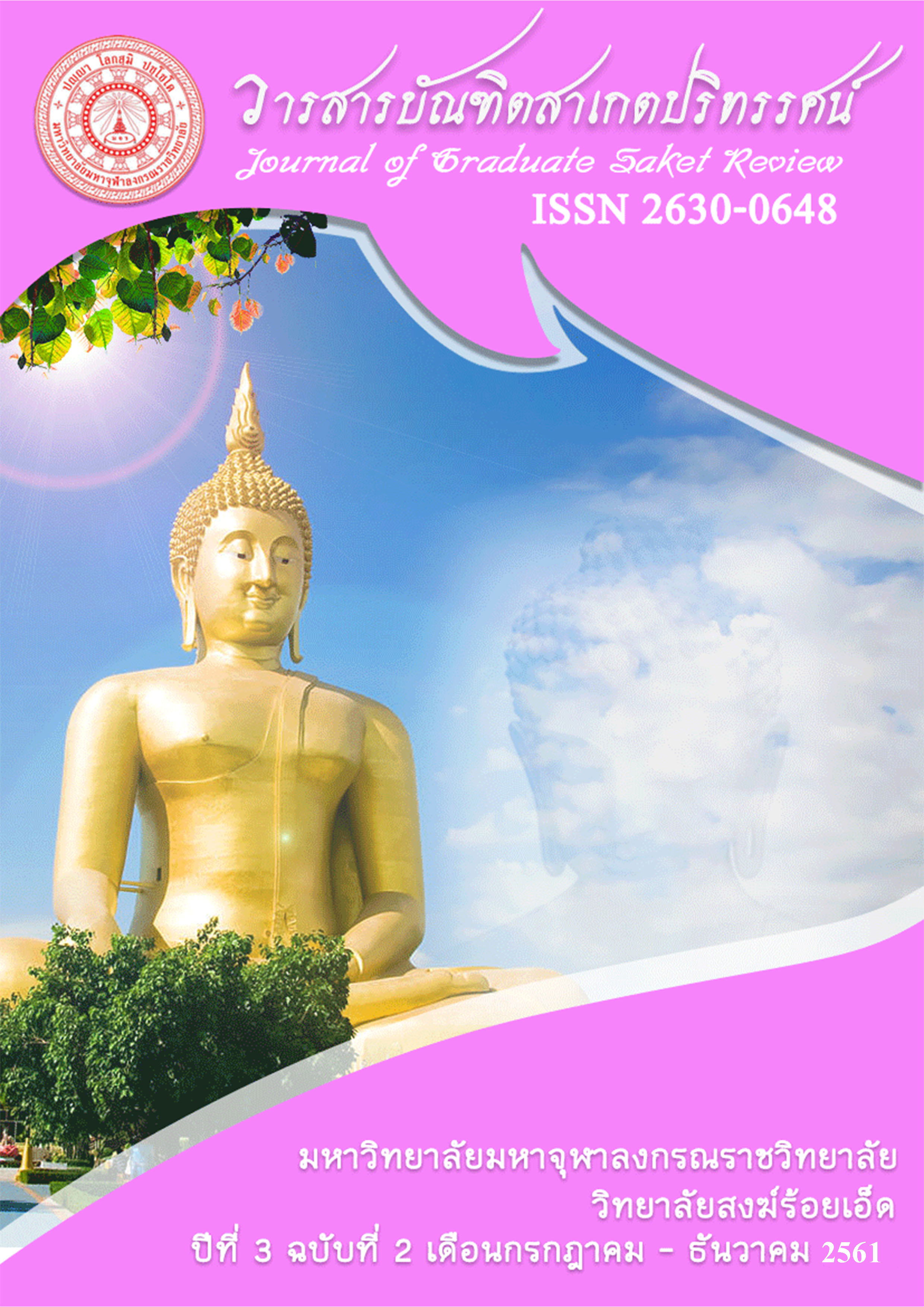กระบวนทัศน์ธรรมมาภิบาลสำหรับผู้นำยุคโลกาภิวัตน์
Main Article Content
บทคัดย่อ
แนวคิดธรรมาภิบาลสำหรับผู้นำในปัจจุบันยังมีอำนาจแบบอัตตาธิปไตย รวมถึงอุปาทาน 4 แฝงอยู่ ทั้งนี้โดยพิจารรจากเผ้าหมายในเชิงผลประโยชน์ จะมุ่งประโยชน์ส่วนตนรเป็นหลักมากกว่าประโยชน์ส่วนรวม ส่วนพุทธธรรมาภิบาลจะเน้นประโยชน์ทั้งสองคือ ประโยชน์ของทุกฝ่าย ร่วมทั้งประโยชน์ในโลกนี้และประโยชน์ในโลกหน้า สาเหตุสำคัญที่ทำให้ธรรมมาภิบาลไม่ประสบความสำเร็จส่วนหนึ่งเกิดจากความสลับซับซ้อนของสังคตมและสิ่งแวดล้อมในระดับต่าง ๆ เช่น ระดับนานาชาติ ระดับประเทศ ระดับสังคม ระดับองค์กร และระดับครอบครัว แนวคิดพุทธธรรมมาภิบาลให้ความสำคัญกับสิ่งแวดล้อมซึ่งถือว่าเป็นความรับผิดชอบร่วมกันของคนทั้งโลก จะเห็นได้ว่า ธรรมมาภิบาลนั้นเป็นเรื่องของการบริหารจัดการผลประโยชน์ของผู้มีส่วนได้เสียซึ่งเป็นเรื่องที่สำคัญและยากที่สุด จุดอ่อนสำคัญของแนวคิดธรรมมาภิบาลแบบวิทยาการโลกปัจจุบันก็คือเป็นแนวคิดแบบวัตถุนิยมหรือประโยชน์นิยม และให้ความสำคัญกับผู้นำ มากกว่าประชาชนโดยใช้กฎหมายหรือกติการ่วมเป็นเครื่องมือควบคุมประชาชนมากกว่าที่จะเริ่มต้นภายในจิตใจซึ่งมีความละเอียดลึกซึ้งอันเป็นบ่อเกิดแห่งปัญหา
Article Details
เนื้อหาและข้อมูลในบทความที่ลงตีพิมพ์ในวารสารบัณฑิตสาเกตปริทรรศน์ ถือเป็นข้อคิดเห็นและความรับผิดชอบของผู้เขียนบทความโดยตรงซึ่งกองบรรณาธิการวารสาร ไม่จำเป็นต้องเห็นด้วย หรือร่วมรับผิดชอบใด ๆบทความ ข้อมูล เนื้อหา รูปภาพ ฯลฯ ที่ได้รับการตีพิมพ์ในวารสารบัณฑิตสาเกตปริทรรศน์ ถือเป็นลิขสิทธิ์ของวารสารบัณฑิตสาเกตปริทรรศน์ หากบุคคลหรือหน่วยงานใดต้องการนำทั้งหมดหรือส่วนหนึ่งส่วนใดไปเผยแพร่ต่อหรือเพื่อกระทำการใด ๆ จะต้องได้รับอนุญาตเป็นลายลักอักษรจากวารสารบัณฑิตสาเกตปริทรรศน์ ก่อนเท่านั้น
เอกสารอ้างอิง
มหามกุฎราชวิทยาลัย. (2525). พระไตรปิฎกพร้อมอรรถกถา แปล ชุด 91 เล่ม. กรุงเทพมหานคร: โรงพิมพ์มหามกุฎราชวิทยาลัย.
ธานินทร์ กรัยวิเชียร. (2543). คุณธรรมและจริยธรรมของผู้บริหาร. กรุงเทพมหานคร: ศูนย์ส่งเสริมจริยธรรม กพ.
พระธรรมปิฎก (ป.อ.ปยุตฺโต). (2542). การศึกษาเพื่ออารยธรรมที่ยั่งยืน. กรุงเทพมหานคร: สหธรรมิก.
_______. (2539). การสร้างสรรค์ปัญญาเพื่ออนาคตของมนุษยชาติ. กรุงเทพมหานคร: โรงพิมพ์มหาจุฬาลงกรณราชวิทยาลัย.
_______. (2541). นิติศาสตร์แนวพุทธ. กรุงเทพมหานคร: มูลนิธิพุทธธรรม.
_______. (2546). พุทธธรรม. กรุงเทพมหานคร: โรงพิมพ์มหาจุฬาลงกรณราชวิทยาลัย.
_______. (2541). พัฒนาวัฒนธรรมในตัวคนไทย. พิมพ์ครั้งที่ 2. กรุงเทพมหานคร: สหธรรมิก.
_______. (2537). ลักษณะสังคมพุทธ. กรุงเทพมหานคร: สำนักพิมพ์มูลนิธิโกมลคีมทอง.
พระมหาสมชัย กุสลจิตฺโต. (2537). พระพุทธศาสนากับ ดร.เอ็มเบ็กการ์. พุทธจักร. 46(7), 22.
พระมหาสมบูรณ์ วุฑฺฒิกโร (พรรณนา). (2549). ประเด็นโต้แย้งว่าด้วยพระพุทธศาสนาเพื่อสังคม. บัณฑิตศึกษาปริทรรศน์, 2(4), 52-88.
พระวรากรณ์ ชยากโร (พูลสวัสดิ์). (2544). การศึกษาวิเคราะห์แนวคิดเรื่องสังคมอุดมคติในทัศนะของพระธรรมปิฎก (ป.อ.ปยุตฺโต). วิทยานิพนธ์พุทธศาสตรมหาบัณฑิต. บัณฑิตวิทยาลัย: มหาวิทยาลัยมหาจุฬาลงกรณราชวิทยาลัย.
พุทธทาส อินทปญฺโญ. (2538). ธัมมิกสังคมนิยม. กรุงเทพมหานคร: สำนักพิมพ์สยามประเทศ.
สุชีพ ปุญญานุภาพ. (2541). คุณลักษณะพิเศษแห่งพระพุทธศาสนา. กรุงเทพมหานคร: มหามกุฏราชวิทยาลัย.
เสถียรพงษ์ วรรณปก. (2540). คำบรรยายพระไตรปิฎก. กรุงเทพมหานคร: หอรัตนชัยการพิมพ์.


